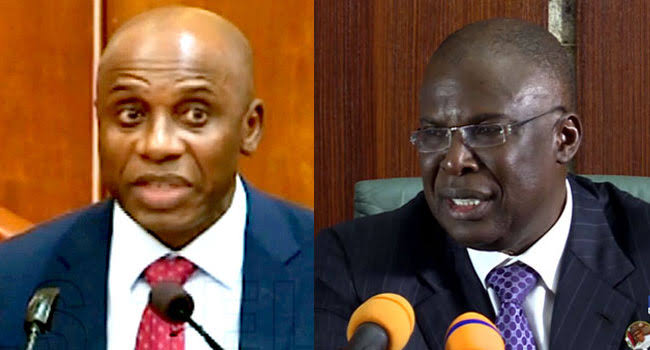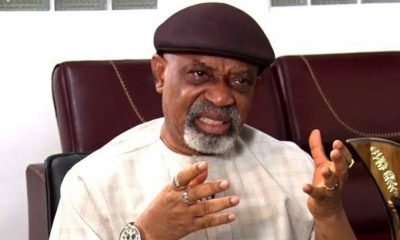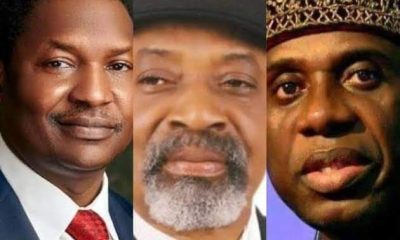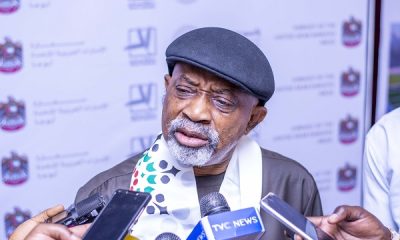Politics
Electoral act: Amaechi, Ngige, Sylva must resign before June if they want to contest presidency

While many Nigerians heaved a sigh of relief when President Muhammadu Buhari signed the electoral act amendment bill into law, political appointees interested in contesting the 2023 elections may not be smiling just yet.
Buhari had rejected the bill four times, the last being in December 2021, after which the proposed law was reviewed by the national assembly and resent to the president.
The president finally approved the bill on Friday, but not after protests by Nigerians and civil society organisations (CSOs).
Speaking while signing the bill, Buhari said the legislation “comes with a great deal of improvement from the previous electoral bill”.
NEW PROVISIONS IN THE ACT
Among the amendments in the new act is the electronic transmission of election results and provision for direct, indirect and consensus methods for political parties to select candidates.
Interestingly, there is also a provision mandating political appointees seeking election to resign their positions before participating in party primaries.
Section 84(12) states that “No political appointee at any level shall be a voting delegate or be voted for at the convention or congress of any political party for the purpose of the nomination of candidates for any election”, while section 29(1) of the act mandates political parties to submit names of candidates not later than 180 days before the election.
Following the approval of the bill, the Independent National Electoral Commission (INEC) updated the schedule of activities for the general election, giving political parties between April 4 and June 3, 2022 to conduct primaries.
This means that political appointees seeking election must resign before June 3 — when INEC expects that all issues on party primaries must have been resolved.
AMAECHI, MALAMI, AKPABIO AND OTHER ‘ASSUMED HOPEFULS’ THAT MAY RESIGN
Going by the provisions of the new act, political appointees — such as Rotimi Amaechi, minister of transportation; Abubakar Malami, minister of justice; Chris Ngige, minister of labour; Emeka Nwajiuba, minister of state for education; Godswill Akpabio, minister of Niger Delta affairs; Timipre Sylva, minister of state for petroleum resources, among others — who have been reportedly linked to presidential and governorship ambitions must resign if they want to contest in 2023.
Malami is said to be interested in becoming Kebbi governor; Nwajiuba is being projected by the Project Nigeria Group (PNG) for presidency; Ngige says he is consulting on running for president; Akpabio has received the backing of the Godswill Akpabio Uncommon Transformational Support Organisation (GAUTSO); the Southern Mandate Group and Chibuike Amaechi Crusaders 2023 want the transportation minister to succeed Buhari.
However, section 84(12) of the electoral act, if not reviewed, may constitute a stumbling block for political appointees.
Buhari has criticised that section, which he said “constitutes a disenfranchisement of serving political office holders”. He has also asked the national assembly to delete that section.
EXPERTS REACT
Speaking on section 84(12) of the electoral act 2022, Mike Ozekhome, a senior advocate of Nigeria (SAN), expressed reservations about the provision.
“It means that political appointees would be forced to resign their appointment before they can seek for election and become candidates,” he told TheCable.
“If the national assembly is saying that in the amended act, why are they themselves not also resigning as legislators before they seek to contest? Why are you limiting to ministers and commissioners?”
But Ariyo-Dare Atoye, executive director of Adopt A Goal Initiative, said the section “is a noble electoral provision that will save the nation the enormous government’s resources and instruments usually cornered by political appointees to advance their elective interest”.
“Nigeria suffers double-jeopardy from elected and appointed officials who often use the state’s resources to have an unfair advantage over other contestants,” he said.
“While it is the standard norm in every democracy for elective officials seeking another term of office to remain and vie, however, it is never in the public interest globally for appointees to stay in office once elective interest has been indicated.”






